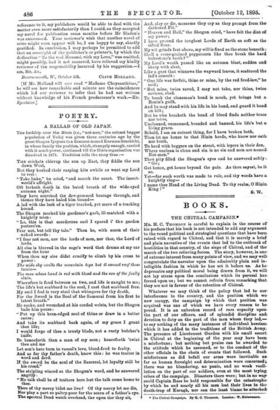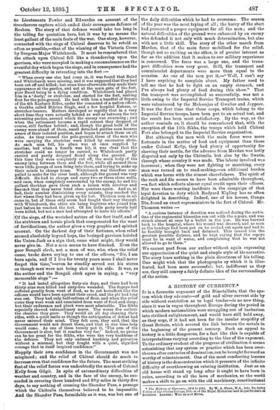BOOKS.
THE CHITRAL CAMPAIGN.*
Mn. H. C. THOMSON is careful to explain in the course of his preface that his book is not intended to add any argument to the vexed political and strategical questions that have been. raised with regard to Chitral, and that it is merely a brief and plain narrative of the events that led to the outbreak of hostilities in that country, of the siege of Chitral, and of the march of the two relieving forces. The story, however, is one- of extreme interest from many points of view, and we may well• congratulate the narrator upon the admirably plain and in- telligible fashion in which he has set it before us. As he- deprecates any political moral being drawn from it, we will not lay stress upon the conclusions which its perusal has. forced upon us; but we cannot refrain from remarking that they are not in favour of the retention of Chitral.
Whatever we may think of the policy that led to our- interference in the country, and the position which we now occupy, the campaign by which that position was, acquired was one of which we have every reason to be- proud. It is an unbroken record of rare capacity upon. the part of our officers, and of splendid discipline and devotion to duty on the part of the men whom they led,— to say nothing of the many instances of individual heroism which it has added to the traditions of the British Army. The presence of Lieutenant Gurdon with his small escort in Chitral at the beginning of the year may have been a misfortune; but nothing but praise can be awarded to• the attitude which he assumed, or to the conduct of the other officials in the chain of events that followed. Such misfortunes as did befall our arms were inevitable as. far as human foresight and determination were concerned; there was no blundering, no panic, and no weak vacil- lation on the part of our soldiers, even at the most trying crises of the campaign. Disasters there were; but in no way could Captain Ross be held responsible for the catastrophe by which he and nearly all his men lost their lives in the death-trap of Karagh, nor can the least blame be attached: • The Chitral Campaign. By H. C. Thomson. London: W. Heinemann. to Lieutenants Fowler and. Edwardea on account of the ;treacherous capture which ended their courageous defence of Reshun. The story of that defence would take too long in the telling for quotation here, but it was by no means the :least gallant-of the main feats of the war. One story, however, 'connected with the siege of Chitral deserves to be retold as .often as possible,—that of the winning of the Victoria Cross by Surgeon-Major Whitchnrch. It must be remembered that the attack upon Chitral fell like a thunderclap upon the garrison, who were occupied in making a reconnaissance on the eventful day which began the siege, and in consequence had the greatest difficulty in retreating into the fort :- " When every one else had come in, it was found that Baird and Whitchurch were missing, and it was supposed that they had been cut off and killed ; but some time afterwards they made their appearance at the garden, and not at the main gate of the fort, poor Baird being in a dying condition. Whitchurch had placed him in a 'dooly,' or stretcher, and started for the fort, making first for the polo-ground. Ho had with him a handful of Sepoys -of the 4th Kashmir Rifles, under the command of a native officer, a Gurkha called Bidrina Singh, and a few hospital Kahars, or stretcher-bearers. Matters developed so rapidly that in a very -short time they were actually behind as well as between the two retreating parties, around which the enemy was swarming ; and when the retirement became a rapid retreat they dropped, of ^course, Still further behind ; and, though the great bulk of the enemy were ahead of them, small detached parties soon became aware of their isolated position, and began to attack them on all sides. As they crossed the polo-ground, three of the men who were carrying the stretcher were killed by successive shots. As each man fell, his place was at once supplied by 'another, but when a fourth was bit, it was clear that the -stretcher could no longer be carried, so Whitchurch partly _carried and partly dragged Baird along the ground. By this time they were completely out off, the main body cf the enemy lying between them and the fort, while all around them 'were little groups of men firing into them, and trying to make up their minds to charge home. Whitchurch was therefore com- pelled to make for the river bank, although the ground was very -difficult. He had to charge and carry two or three stone walls, .and once, when completely surrounded by the enemy, he and his gallant. Gurkhas gave them such a lesson with revolver and 'bayonet that they never tried close quarters again. And so, at last, their number diminishing every minute, they reached the -fort where they had been given up for lost. Thirteen men in all came in, but of these only seven had fought their way through With Whitchurch, the other six being fugitives who joined him just before he reached the fort. Of his little party nearly half mere killed, but not a man had attempted to leave his officers."
,!9f the siege, of the wretched nature of the fort itself, and of ,the stubborn and heroic pluck that compensated for the want .of fortifications, the author gives a very graphic and spirited -account. On the darkest day of their fortunes, when relief seemed absolutely beyond hope, the besieged garrison hoisted the Union-Jack as a sign that, come what might, they would never give in. Not a man seems to have flinched. Even the poor Bengali clerk, not a man of war, who, when the relief came, broke down crying to one of the officers, "Sir, I am 'born again, and if I live for twenty years more I shall never forget this time,"--even he steadily served out his stores as though men-were not being shot at his side. It was, as the author and the Bengali clerk agree in saying, a "very memorable siege " " It had lasted altogether forty-six days, and there had been thirty-nine men killed and sixty-two wounded. The Sepoys had Buffered greatly from want of food, as to eat horseflesh like the cers would have been against their creed, and the ghi had long Tun out. They had only half-rations of flour, and when the relief came they were weak and emaciated from want of food and sleep ; but their endurance and pluck were most admirable. The Sikhs -especially showed extraordinary nerve. The worse the- outlook the cheerier they grew. They would sit all day cleaning their rifles, with a quiet smile as though the anticipation of defeat had mover entered their mind. They felt sure, they said, that the 'Government would not desert them, and that in due time help would come. As one of them tersely put it, 'The arm of the ',Government is slow, but it reaches very far.' Indeed, no praise can be too great for the Sikhs, who were the very backbone of the defence. They not only endured hardship and privation without a murmur, but they fought with a quiet, dignified courage that in itself inspired confidence."
Happily their own confidence in the Government was not misplaced ; and the relief of Chitral should do much to increase even that confidence for the future. The most striking feat of the relief forces was undoubtedly the march of Colonel Kelly from Gilgit. In spite of extraordinary difficulties of 'weather and country, and in the face of the enemy, he suc- ceeded in covering three hundred and fifty miles in thirty-five days, to say nothing of crossing the Shandur Pass, a passage -which the Chitralis themselves believed to be impossible. And the Shandar Pass, formidable as it was, was but one of the daily difficulties he had to overcome. The season of the year was the most trying of all ; the hurry of the start had prevented a proper equipment for all the men ; and the natural difficulties of the ground were enhanced by an enemy who defended it not only with much determination, but also
with not a little skill. The story of the other march from Mandan, that of the main force mobilised for the relief. though not so exciting as the other, is of greater interest as far as the addition that it makes to our military experience is concerned. The force was a large one, and the trans- port difficulties were very great. Still, the transport and commissariat departments were more than equal to the
occasion. As one of the men put it,—" Well, I can't say I have anything to complain about. My father used to tell me that he had to fight on an empty stomach, and I've always had plenty of food daring this show." That
the transport was accomplished so successfully, was not a little owing to the Imperial Service Transport trains, which
were volunteered by the Maharajas of Gwalior and Jeypore. It was the first time that these corps, which belong to the Imperial Service troops, have been put to an actual test, and the result has been most satisfactory. By the way, as the author reminds us, it should be remembered that, with the exception of the 14th Sikhs, the troops which held Chitral Fort also belonged to the Imperial Service organisation.
But although the men with the main force were more fortunate in the matter of food and equipment than those under Colonel Kelly, they had plenty of opportunity for showing their mettle, for the advance from Mardan was hotly disputed not only by the Chitralis, but also by the Swatis, through whose country it was made. The labour involved was incessant ; when they were not fighting or marching, every man was turned on to road-making,—an additional burden
which was borne with the utmost cheerfulness. The spirit of the rank and file seems to have been admirable throughout, —a fact which reflects almost equal credit upon their officers. Nor were there wanting incidents in the campaign of that loyal devotion to duty which Rudyard Kipling has so often delighted in describing. Indeed, one of his heroes, Gnnga
Din, found an exact representative in the fort of Chitral. Mr. Thomson writes :—
" A curious instance of devotion was noticed during the sortie. One of the regimental bheesties ran out with the sepoys, and was struck almost at once by a bullet in the jaw. He was hurried back to the hospital, where his wound was dressed, and as soon as the bandage had been put on be rushed out again and had to be forcibly brought back and detained. This caused him the greatest possible distress, and he kept saying that the sepoys must be in want of water, and complaining that he was not allowed to go to them."
We cannot part from our author without again expressing our appreciation of the quiet and simple style of his narrative. The story loses nothing in the plain directness of his telling. One might wish that the photographs oy which it is illus- trated, had been more successful; but, indifferent as they are, they still convey a fairly definite idea of the surroundings of the action.



















































 Previous page
Previous page